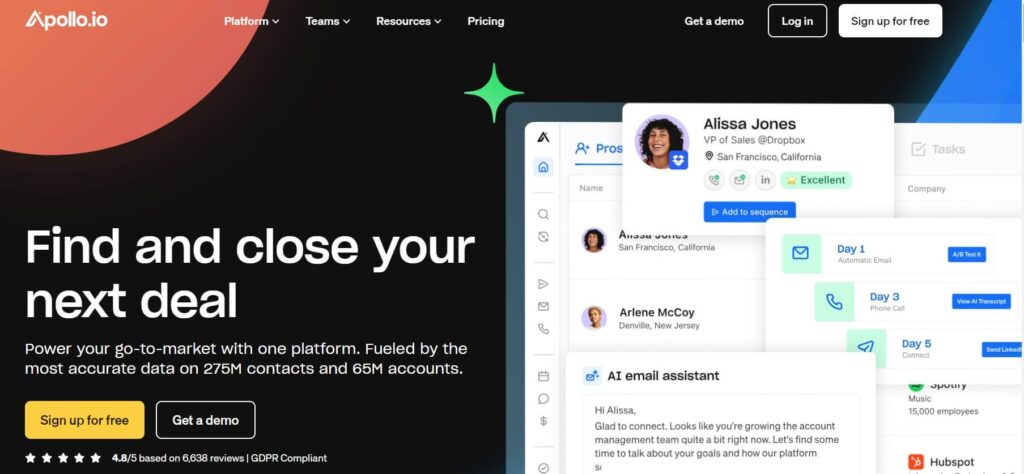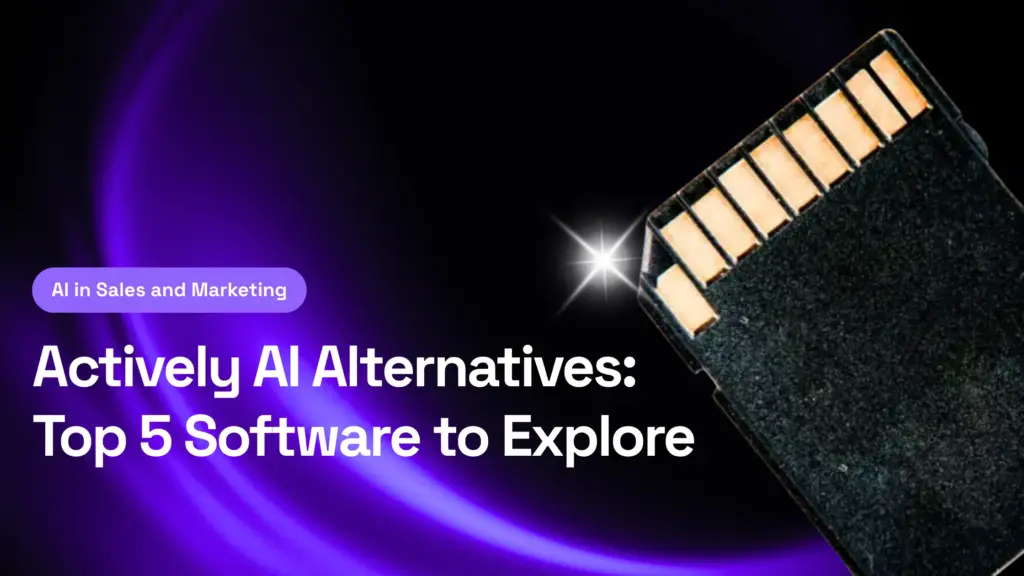Are you ready to discover the formula for exponential company expansion? In the realm of B2B exchanges, leads are the lifeblood driving market growth and income sources, not only possible consumers. But exactly are B2B leads? Simply said, these are people or businesses eager to buy your goods or services, thereby supporting your marketing and sales plans.
Imagine this: according to a recent survey, over 60% of marketers list creating traffic and leads as their main obstacle. Still, the scene of learning these has changed significantly. More complex, data-driven strategies made possible by technology are replacing conventional approaches include cold phoning or bulk email blasts. This change from hand to modern methods goes beyond simply keeping current to include resource optimization, accuracy improvement, and drastically higher return on investment.
Let’s figure out whether buying leads is really worth it, or if it’s just a waste of time and money. Additionally, there are significant ethical considerations involved.
How to Get B2B Leads Online
- Content Marketing. Attract leads with valuable content.
- SEO and SEM. Increase visibility through search engine strategies.
- Social Media Marketing. Engage potential leads on platforms like LinkedIn.
- Email Marketing. Personalize outreach to attract leads.
- Networking Events. Gain leads through industry conferences and events.
- Referral Programs. Leverage existing customers to generate leads.
- Webinars and Online Workshops. Offer educational sessions that address common challenges or topics of interest in your industry.
- PPC Advertising. Use pay-per-click advertising on platforms like Google Ads or social media to target specific demographics.
- Influencer Partnerships. Collaborate with industry influencers who can introduce your brand to their followers.
- Video Marketing. Create engaging video content that can be shared on YouTube, social media, or embedded on your site.
- Cold Outreach. Use targeted cold emails or messages to connect with potential leads.
- Online Directories and Listings. List your business in online directories relevant to your industry to improve visibility.
- Retargeting Campaigns. Implement retargeting ads to capture the attention of visitors who didn’t convert during their first visit to your site.
- Interactive Tools. Develop tools like calculators, assessments, or quizzes that can help potential leads solve problems while capturing their contact information.
- Live Chats and Chatbots. Use chat technology on your website to engage visitors in real-time, providing immediate answers to their inquiries and capturing lead data.
- Affiliate Marketing. Partner with other companies or individuals who can promote your products or services in exchange for a commission.
Interested in details? Check out our article – How to Find B2B Leads: Every Possible Way w/AI (Free + Paid)
Who Should Acquire B2B Leads
Across a wide range of companies, especially those ready for expansion or trying to carve out a presence in competitive areas, acquiring B2B leads is a strategic need. Startups, for example, can depend on a strong B2B lead pipeline to rapidly acquire traction and validate their company models. Having access to quality leads could make all the difference between early stagnation and fast expansion as they negotiate the first obstacles of market entrance.
Likewise, companies in expansion—whether they are introducing new goods or entering new markets—need a consistent flow of B2B leads to keep momentum and raise market share. For these businesses, good lead generation goes beyond mere number to include improving the quality of leads to guarantee fit with their changing corporate plans.
Furthermore, established companies trying to keep control or avoid rivalry might gain much from updated lead acquisition plans. In sectors where innovation cycles are quick, remaining relevant entails remaining proactive in lead generating.
Basically, as it directly affects their development path and market positioning, any company using a B2B model might discover benefit in obtaining leads. From young startups to big enterprises, businesses all around can customize their products to satisfy the complex demands of their business consumers by properly utilizing these leads, hence guaranteeing continuous achievement and revenue.
Using B2B Lead Lists
Using B2B lead lists can be a powerful strategy for business growth, though it requires thoughtful execution to maximize their potential. Purchased lead lists offer immediate access to numerous potential contacts, but the real art lies in how these leads are utilized.
Direct Marketing
Among the main techniques for using these lists is direct marketing. Businesses can rapidly present their products by personally reaching out to the contacts by email, phone calls, or even direct mail. To turn leads into possible consumers, this approach calls for a strong message and an obvious call to action.
Segmentation
Making the most of lead lists depends on segmentation in great part. Businesses can more precisely target their marketing activities by grouping leads according to particular parameters as industry, firm size, or job. This deliberate method guarantees that the message appeals to the audience, therefore raising the possibility of interaction.
Targeting
Though it emphasizes more on personalizing the marketing techniques to meet the particular demands and pain points of every segment, targeting is closely related to segmentation. Personalized email campaigns, tailored adverts, or tailored promotional offers specifically addressing the needs of every group might all go under this category.
Market Analysis
One more important application of bought lead lists is market analysis. Examining the information in these lists will help businesses understand consumer preferences, industry trends, and competitive environments.
Effectively using B2B lead lists involves a blend of these strategies. It’s not just about reaching out to many potential customers but doing so in a way that is informed, targeted, and personalized. This approach not only helps in converting leads into customers but also in building long-term relationships that are beneficial for sustained business growth.
Pros and Cons of Buying B2B Leads

Imagine you’re at the helm of a burgeoning B2B enterprise, eager to catapult your business into its next growth phase. You’ve heard that buying B2B leads can be a shortcut to achieving that goal. It’s tempting, right? Let’s explore the journey of buying B2B leads through the lens of its potential benefits and pitfalls.
The Bright Side of Buying B2B Leads
The allure of buying B2B leads lies in its promise of immediacy and extensive reach. Picture this: one day, your prospective customer list is just a modest group familiar with your offerings; the next, it’s a treasure trove of names and numbers spanning the breadth of your market. You now have instant access to a vast landscape of potential clients, ready to be tapped. This can be particularly beneficial when breaking into new geographic territories or verticals, where you lack established connections. The idea is simple: more leads equal more potential sales, propelling your business forward faster than traditional lead generation methods could.
The Challenges and Pitfalls
However, as with any shortcut, there are risks. First, let’s talk about quality. Imagine spending part of your precious budget on a list full of outdated contacts or leads that don’t align with your target market. The result? Your team wastes time chasing dead ends instead of engaging with viable prospects. High costs can also be a stumbling block. Lead lists don’t come cheap, and without guaranteed conversions, the return on investment becomes questionable.
Then there’s the risk to your reputation. Reach out to someone who hasn’t expressed interest in your services, and you might be labeled as intrusive or spammy—hardly the first impression you want to make. And don’t forget about legal concerns. In an age where data privacy is paramount, inadvertently violating regulations like GDPR by using improperly sourced leads can lead to hefty fines and legal headaches.
The Verdict
While the immediate access and expanded reach offered by purchasing B2B leads sound appealing, the potential drawbacks—like poor quality, high costs, reputation risks, and legal issues—suggest a need for caution. Before taking this route, consider whether these risks align with your business’s long-term growth strategy and ethical standards.
Legal and Ethical Considerations

Particularly with regard to the purchase and use of B2B leads, the threads of legal and ethical issues are tightly spun into the fabric of daily operations in the complicated tapestry of modern business. Let’s explore a narrative that shows the need of negotiating these waters with both awareness and care.
Imagine a bright startup called “TechInnovate,” a growing participant in the software market. Under the direction of a vibrant team, TechInnovate is keen to increase the scope of its market and has chosen to get a B2B lead list from apparently credible supplier. The list seems to offer hundreds of possible customers all throughout Europe.
The team is passionate as TechInnovate starts its outreach; the opportunities appear almost endless. But the first thrill soon gives way to a tempest of difficulties. One of the companies who contacted notes they never opted in to get such communications, which begs questions regarding data protection legislation compliance. This event sets off a more thorough inquiry and reveals that many of the leads on the list had not specifically agreed for their data to be sold or shared—a flagrant violation of the General Data Protection Regulation (GDPR), a strict set of laws meant to guard personal data in the European Union.
This neglect has serious repercussions. TechInnovate suffers not just possible fines that might destroy their small company but also damage in reputation. The business now has to negotiate legal complexity and rebuild consumer and competitor perception of it.
This sobering story emphasizes the crucial need of knowing and following data privacy rules like GDPR while collecting and applying business-to—business leads. These rules are meant to serve not only to safeguard personal information but also to create a clear, reliable environment for international trade. Compliance is a pillar of ethical corporate conduct not only a legal requirement.
Businesses entering the realm of B2B lead generation must make sure any acquired leads come from reliable sources that carefully follow the pertinent data protection rules. Furthermore in line with legal requirements and improves the company’s credibility as a reliable partner by following policies including clear opt-out choices and gaining specific permission.
Main Platforms to Buy B2B Leads
ZoomInfo

ZoomInfo is unique in depth of data and sophisticated search features. It offers sales signals, updated firm profiles, and accurate contact information to guide outreach. Using artificial intelligence and machine learning, the platform constantly updates and verifies its data to guarantee consumers receive the most recent information. For companies needing thorough understanding for strategic account targeting, it’s especially helpful.
Apollo

Apollo not only provides a large B2B lead database but also links with your CRM to improve workflow automation. It supports sales plans with features for tracking involvement, email sequencing, and lead scoring. Apollo is a great tool for sales teams trying to maximize their outreach activities since its data enable real-time campaign refining.
Cognism

Specializing in lead creation and prospecting, cognition offers a potent sales acceleration platform. Given a heightened focus on compliance—especially with laws like GDPR— Cognism is perfect for companies running across several countries. The platform provides tools including a patented data purification system to maintain your sales funnel full with high-quality, actionable leads and event-based triggers.
LinkedIn Sales Navigator

Leveraging LinkedIn’s vast professional network, this tool helps salespeople identify and reach decision-makers. Sales Navigator provides tools to efficiently save and arrange leads, advanced search filters, and custom recommendations for leads depending on user behavior and preferences. Its connection with LinkedIn offers special insights into lead activity, so enabling customized outreach plans.
DiscoverOrg

Especially for IT and other technological areas, DiscoverOrg specializes in offering very precise data. Deep organizational charts, thorough project insights, and buying signals on the platform allow users predict market demands and create persistent and timely pitches. For high-touch sales operations depending on thorough research and exact timing, it is a priceless tool.
LeadGenius

LeadGenius delivers bespoke data that fits particular client needs by combining technology with human knowledge. Companies running in specialist sectors and those seeking highly customized marketing campaigns would especially find this platform helpful. LeadGenius provides companies with highly customized and accurate means of helping them to scale their outreach.
UpLead

UpLead stresses real-time contact data verification in order to guarantee great accuracy for its users. For competitive positioning and tailored outreach, the platform includes tools including technographics, which give insights into the technologies businesses use. Sales teams will find it simple to quickly discover and interact with prospects using UpLead’s user interface.
Lusha

Renowned for its simplicity and ease of use, Lusha gives rapid access to contact details including email addresses and phone numbers. Its power resides in allowing direct contacts with prospects, especially helpful to small to medium-sized companies. Lusha also provides a browser tool that simplifies lead creation by rapidly pulling contact details from social media networks.
ContactOut

Mostly used by recruiters, ContactOut provides tools to rapidly locate personal emails and mobile numbers—valuable for salespeople as well. The portal is a trustworthy option for contacting hard-to-reach experts since it promises to have among the best rates of accuracy in the business. Contact Out’s seamless integration with LinkedIn improves its value for those who depend on LinkedIn for prospecting.
SalesIntel

Sales Intel provides accurate and useful B2B contact data to help to streamline the prospecting process. It emphasizes on offering confirmed email addresses and direct dial numbers, therefore saving the time sales teams spend on lead qualification. Users of the platform can request particular contacts and SalesIntel’s analysts will supply the data within a few hours thanks to a research-on-demand service.
Industry Benchmark for Prices of Leads
Understanding industry benchmarks for price is absolutely vital when deciding whether to buy B2B leads since the quality and specificity of the material supplied will greatly affect the pricing. Costs connected to poor, medium, and high-quality leads are broken out below in great detail:
Low-Quality Leads
Usually lacking much to no extra qualifying or segmentation, low-quality leads comprise simple contact information including name, title, and company. Low-quality leads may cost anything from $20 to $40 per. Lack of thorough information and possible data errors could cause businesses to discover that these leads have a lower conversion rate.
Medium-Quality Leads
Medium-quality leads sometimes have more comprehensive information, including confirmed contact details, industry or revenue size, and maybe some degree of purpose or interest qualifying. Usually more targeted, these leads have some degree of validation underlined. Generally speaking, medium-quality leads cost between $50 and $100 apiece. Their greater conversion rates than low-quality leads help to better balance cost and possible benefit.
High-Quality Leads
High-quality leads are the most expensive, typically costing over $100 per lead, but can go much higher depending on the depth of information and the degree of pre-qualification. These leads might include detailed insights such as specific business needs, budget authority, and purchase timelines, making them highly actionable. High-quality leads are often exclusive or semi-exclusive, meaning fewer competitors have the same information, thereby increasing the likelihood of conversion.
Additional Considerations
👉Volume Discounts
Many lead providers offer discounts for bulk purchases. This can significantly lower the cost per lead, especially for businesses that require a steady influx of new contacts.
👉 Customization Costs
If leads need to be highly customized or require additional research (e.g., specific decision-maker roles within niche markets), prices can increase accordingly.
👉 Subscription Services
Some platforms operate on a subscription model where you pay a monthly fee for access to a set number of leads or unlimited lead searches. This can be more cost-effective for companies that consistently need new leads.
Average Paid Cost Per Lead by Industry
This graph presents the average paid cost per lead across various industries, illustrating the financial investment required to generate leads through paid channels. The data suggests significant variation among industries, with “Aerospace & Aviation” showing notably higher costs, indicative of the specialized nature and high value of leads in this sector. Conversely, industries like “Biotech” and “Automotive” demonstrate more moderate costs. This information is vital for businesses in these industries to benchmark their marketing budgets and to understand how their lead acquisition costs compare to the industry norms.
Average Organic Cost Per Lead by Industry
The second graph depicts the average organic cost per lead by industry, providing insight into the cost efficiency of non-paid lead generation strategies. Similar to the paid cost graph, there is noticeable variation among industries. The graph indicates that “Aerospace & Aviation” also leads in organic costs, which aligns with the trend observed in the paid lead costs and reflects the industry’s overall high lead value.
This graph serves as a crucial tool for evaluating the effectiveness of organic lead generation efforts. For industries where organic costs are low, such as “B2B SaaS” and “Biotech,” there is a clear indication that non-paid strategies can be particularly effective and cost-efficient. Companies in these sectors might benefit from investing more heavily in organic lead generation techniques like SEO, content marketing, and social media engagement.
The Alternative: AI-Driven Lead Generation
As we’ve come to understand, purchasing pre-made lead lists is far from the best approach. This method is not only costly and risky, but also time-consuming. Often, these lists are outdated, poorly crafted, and do not meet the quality standards necessary for effective lead generation. Therefore, replacing this outdated method with a solution like AnyBiz is the ideal choice for modern businesses seeking efficiency and reliability in their lead generation processes.
AnyBiz present a radical substitute for conventional lead acquisition strategies. These creative instruments are altering the field of B2B marketing and sales with several advantages that improve effectiveness and efficiency.
Benefits of Using AI Tools Like AnyBiz
Real-Time Data Updates
One of the standout features of AI-driven platforms is their ability to provide real-time updates on lead data. This ensures that the information you receive is not only current but also highly relevant. Unlike traditional methods, where data can quickly become outdated, AI tools continuously gather and analyze fresh data, giving businesses the edge in quickly changing markets.
Cost-Effectiveness
Traditional lead generation often involves significant expenditure on human resources and various marketing campaigns with uncertain returns. In contrast, AI tools like AnyBiz streamline these processes, significantly reducing costs. By automating repetitive tasks and minimizing human error, these platforms offer a higher ROI, making them a more economical choice for businesses looking to optimize their lead generation budget.
Targeted Outreach
AI enhances lead targeting by analyzing vast amounts of data to identify the most promising prospects based on behavior, preferences, and potential needs. This level of personalization ensures that outreach efforts are directed only towards the most relevant and likely to convert leads, increasing the efficiency of sales campaigns and boosting conversion rates.
Compliance with Regulations
Navigating the complex web of data protection laws and regulations, such as GDPR, is a significant challenge in traditional lead generation. AI-driven tools are designed with compliance at their core, automatically adhering to these regulations. This not only protects businesses from potential legal consequences but also builds trust with customers by upholding high standards of data privacy.
Highlighting Advanced Features and Compliance
Platforms like AnyBiz not only perform tasks traditionally done by sales development representatives but also bring a level of precision and adaptability that manual processes cannot match. They leverage algorithms to make smart decisions, predict customer behavior, and personalize interactions across various channels like email, LinkedIn, and Twitter.
Moreover, these AI tools ensure compliance automatically, addressing one of the major pain points for businesses in the digital age. With strict adherence to the latest data protection standards, companies can focus more on their core activities without worrying about violating privacy laws.
In summary, AI-driven lead generation offers a robust alternative that outperforms traditional methods in virtually every aspect: it is more precise, more efficient, more cost-effective, and compliant with modern data protection regulations. By adopting platforms like AnyBiz, businesses can not only keep up with but lead in the competitive race of B2B marketing.
Conclusion
In essence, buying pre-made lead lists has major drawbacks even if the conventional method of filling the sales pipeline seems like a short fix. Due to compliance problems with data protection rules, these lists are sometimes costly, maybe outdated, and carry many ethical and legal hazards. Furthermore, the caliber of leads could not fit the particular requirements of your company, hence wasting money and work.
Rather, contemporary companies should think about using AnyBiz’s AI-driven platforms. AnyBiz presents a more ethical, quick, and efficient way to lead generation with its sophisticated algorithms, real-time data updates, and data security rule compliance. It not only improves the caliber of leads but also guarantees a greater return on investment by means of planned and focused marketing initiatives.
Using the 7-day free trial will help you to really appreciate the advantages and possibilities of AnyBiz. This chance lets you see yourself how AnyBiz might revolutionize your lead generating systems without any prior commitment.
📜 Related articles:






